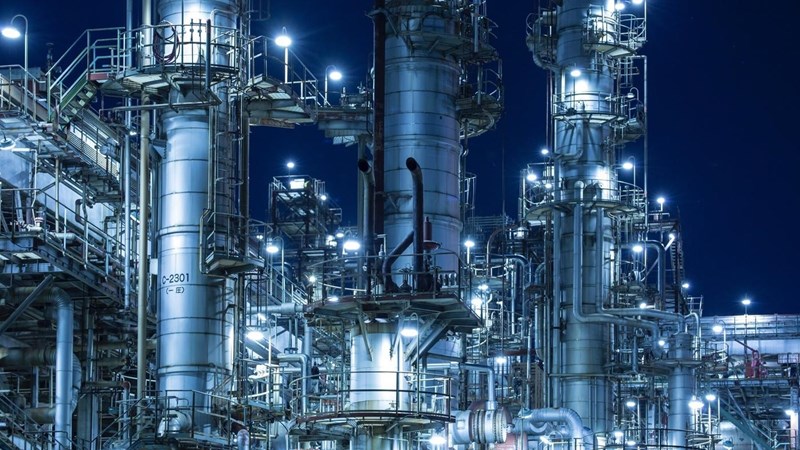Discuss your challenges with our solutions experts
Transforming energy: 5 key questions ahead of Gastech 2024
Wood Mackenzie is proud to be the Knowledge Partner this year at Gastech 2024
6 minute read
Massimo Di Odoardo
Vice President, Gas and LNG Research

Massimo Di Odoardo
Vice President, Gas and LNG Research
Massimo brings extensive knowledge of the entire gas industry value chain to his role leading gas and LNG consulting.
Latest articles by Massimo
-
Opinion
The impact of the Israel-Iran conflict escalation on the global energy market
-
Opinion
Gas, LNG & The Future of Energy: investment momentum builds in a volatile market
-
The Edge
WoodMac’s Gas, LNG and the Future of Energy conference: five key themes
-
The Edge
Upside pressure mounts on US gas prices
-
Opinion
Video | Lens Gas & LNG: Will Russian gas and LNG come back?
-
The Edge
What a future Ukraine peace deal means for energy (part 1)
Kateryna Filippenko
Research Director, Global Gas Markets

Kateryna Filippenko
Research Director, Global Gas Markets
Principal Analyst with a focus on the European gas market and the development of alternative scenarios.
Latest articles by Kateryna
-
Opinion
Gastech 2024: Our top three takeaways
-
The Edge
Future energy: biomethane’s time has come
-
Opinion
From digester to burner tip: navigating the fast-growing RNG industry
-
Opinion
Transforming energy: 5 key questions ahead of Gastech 2024
-
Opinion
Global gas industry in the 2050 net zero world
-
The Edge
WoodMac’s Gas, LNG & Future of Energy conference – five key takeaways
Daniel Toleman
Research Director, Global LNG

Daniel Toleman
Research Director, Global LNG
Daniel's expertise covers global LNG markets, asset analysis, project economics, contracting and corporate analysis.
Latest articles by Daniel
-
Opinion
Dare to be bold: Australia’s East Coast gas market
-
Opinion
Shining a light on the “coal versus LNG emissions” debate
-
Opinion
Asia Pacific gas & LNG: 5 things to look for in 2025
-
Opinion
Preparing for ADIPEC 2024: 3 crucial questions answered
-
Opinion
Transforming energy: 5 key questions ahead of Gastech 2024
-
Opinion
Woodside acquires Tellurian and the Driftwood LNG project
Raghav Mathur
Principal Research Analyst, Gas & LNG

Raghav Mathur
Principal Research Analyst, Gas & LNG
Raghav Mathur leads the South Asia, gas and LNG research at Wood Mackenzie
Latest articles by Raghav
-
Opinion
How Asia will drive global gas and LNG investment to 2050
-
Opinion
Industrial demand, shrinking production fuel rise in Indian LNG imports
-
Opinion
Transforming energy: 5 key questions ahead of Gastech 2024
-
Opinion
Will India’s new regulations release pressure on LNG?
Fraser Carson
Principal Research Analyst, Global LNG

Fraser Carson
Principal Research Analyst, Global LNG
Fraser has extensive research and project management experience across the LNG value chain.
Latest articles by Fraser
-
Opinion
Video | Lens Gas & LNG: Golar and partners' FID set to revive Argentina's LNG export ambitions
-
Opinion
Transforming energy: 5 key questions ahead of Gastech 2024
-
Opinion
The US broadens sanctions against Arctic LNG-2
-
Opinion
Hoegh Galleon helps Egypt’s gas crunch but delays Australian LNG imports
-
Opinion
LNG trade disrupted as Suez Canal transits stop
-
Opinion
Floating LNG is back in vogue
Mark Bononi
Principal Analyst, Global Gas & LNG Assets

Mark Bononi
Principal Analyst, Global Gas & LNG Assets
Mark brings more than two decades of broad and deep experience as a global energy investor and analyst.
Latest articles by Mark
-
Opinion
Video | Lens Gas & LNG: What is Venture Global's LNG strategy?
-
Opinion
Transforming energy: 5 key questions ahead of Gastech 2024
-
Opinion
Biden’s pause on US LNG export approvals: four questions answered
With over 800 exhibitors, Gastech is the world’s largest energy exhibition and conference, bringing together leading players across the spectrum of natural gas, LNG, hydrogen, climate technologies, energy manufacturing, and low-carbon solutions.
This global event has become a focal point for addressing the complex challenges and opportunities as we transition toward a cleaner, more sustainable energy future.
As a proud Knowledge Partner of Gastech 2024, we are dedicated to advancing discussions on critical industry topics. In the lead-up to the event, our experts tackle key questions that will shape the debate within the gas and LNG sectors.
When will the pause on US LNG export approval be lifted?
Author: Mark Bononi, Principal Analyst, North America LNG Asset Research
Since January, the US LNG industry has been mired in uncertainty. The Biden administration announced a “pause” in export approvals for new LNG projects, pending a Department of Energy analysis of their environmental and economic impacts.
The fluid policy environment has had a clear impact on the industry. There have been no new final investment decisions (FIDs) for US LNG projects in over a year, with sales activity largely confined to interest from Middle Eastern NOCs and projects that had already secured critical non-FTA export approvals from the DOE.
Most are turning to the November election for an indication of the US LNG industry's outlook and course. In March, Jennifer Granholm, the US energy secretary, indicated that the pause on new export permits would be lifted within a year and that it would be lifted by a future Democratic administration (although she was speaking when President Biden was still in the running to serve a second term). Former President Trump has said he would end the pause immediately if re-elected.
Ultimately, there is consensus that the pause will be lifted once the US elections are over. However, uncertainties remain on how quickly a new framework for approval will be developed and how it will evolve, particularly under a Democratic administration.
Will Russia be able to develop more LNG export capacity?
Author: Fraser Carson, Principal Analyst, Global LNG Asset Research
Russia maintains ambitious plans to grow its LNG market share. But even starting production from its recently developed Arctic LNG-2 is proving challenging, following recent US sanctions. LNG exports, if any, are expected to be small and sporadic. And even existing production from Yamal LNG could be at risk, as further US sanctions on Russian LNG cannot be ruled out.
In this context, developing new LNG export capacity will be challenging. The EU’s ban on the provision of LNG technology to Russia continues to restrict access to Western components and expertise used by the rest of the LNG industry. Chinese companies have provided some support in the interim, but Wison New Energies' decision to discontinue all ongoing work on Russian projects seems to suggest that Chinese companies are not willing to risk the threat of secondary sanctions.
Domestic technology and plant re-designs are required to get new capacity off the ground and maintain production. Specialised ice-class LNG ships - notoriously difficult to build - will also need an in-house solution. It will take years to develop viable alternatives, and success is no guarantee. By then, the window of opportunity might have already passed.
How will EU legislation on methane emissions affect global LNG markets?
Author: Kateryna Filippenko, Director, Global Gas Markets Research
The EU has recently approved a new regulation that imposes measurement, reporting and verification of methane emissions from hydrocarbons, including those imported into the region. Clarity still needs to emerge regarding specific acceptable methane thresholds, the magnitude of penalties to be paid above those thresholds and whether this will apply to newly signed contracts or all imports.
But with growing scrutiny over LNG emissions credentials, an EU tax on all LNG methane emissions cannot be ruled out. Further down the line, we may even see the EU implement a broader tax on all GHG emissions from LNG imports.
A methane tax on LNG imports will increase European prices and split the market between the premium, taxed European destination and a non-premium, non-taxed one. Some producers will prefer to optimise flows and target non-taxed markets – especially when faced with the high costs of decarbonising the LNG value chain. But some may be encouraged to tackle their methane emissions – one of the lower-cost abatement options – and take advantage of the European premium. But much will depend on the materiality of the methane tax and its ability to provide a material signal. All eyes will be on what the EU does next.
Can Asian LNG demand growth live up to expectations?
Author: Raghav Mathur, Principal Analyst, APAC Gas and LNG Research
The case for increased use of gas and LNG in Asia, particularly in emerging markets, is compelling. Growing population and improving living standards will continue to boost energy demand, a while gas’ environmental credentials make it a viable option, alongside renewables, to reduce dependency on polluting and carbon-intensive coal.
The pandemic significantly impacted Asian LNG demand. After the Russian invasion of Ukraine, Europe has been outcompeting Asian buyers to secure LNG imports, leading to record-high prices. However, the first eight months of 2024 have shown a strong recovery, with emerging Asian markets increasing LNG imports by 15%.
With 200 mmtpa of LNG currently under construction, LNG demand in Asia is expected to kick start a new period of sustained growth. However, lower prices, infrastructure development, and domestic policies to limit the use of coal are all key to unlocking Asian LNG demand growth potential.
Is now the right time for buyers to commit to long-term contracts?
Author: Daniel Toleman, Director, Global LNG Asset Research
With global LNG markets having somehow rebalanced in the past two years, buyers have had the upper hand in contract negotiation. Brent-linked prices have now fallen into the 12-12.5% range, marking a substantial decline from the more than 14% at the peak of the market. And with 200 mmtpa of LNG currently under construction, many have expected oil-indexed contract prices to continue to fall.
But whether prices will effectively fall further, is becoming increasingly uncertain. Delays in LNG projects under construction and sanctions on Russian LNG are eroding the magnitude of the anticipated wave of LNG. Meanwhile, the US pause of non-FTA approval is providing uncertainty on the timing of additional US LNG developments. There is a risk that the much-awaited rebalancing of the global LNG market will be less pronounced than previously anticipated.
Ultimately, whether it’s the right time for buyers to commit to long-term contracts depends on their demand requirements and the composition of their portfolio. Prices have now come down to a relatively low level, including when compared to Henry Hub-linked prices. Spot LNG prices are set to soften from 2026, but with plenty of risks in the market, there are no guarantees that long-term oil-indexed prices will fall further. For buyers in need of LNG this decade, committing now to long-term contracts could prove the safest bet.
See you at Gastech 2024
As the official Knowledge Partner of Gastech 2024, Wood Mackenzie brings its industry expertise and distinct viewpoint to the dialogue about the future of gas and LNG. We will host a series of invite-only dynamic roundtables, present at the strategic conference and moderate many senior panel sessions.
Don't miss the opportunity to visit us at booth B213, Hall 3 to meet our experts, demo our products and gain our latest gas & LNG insight.












